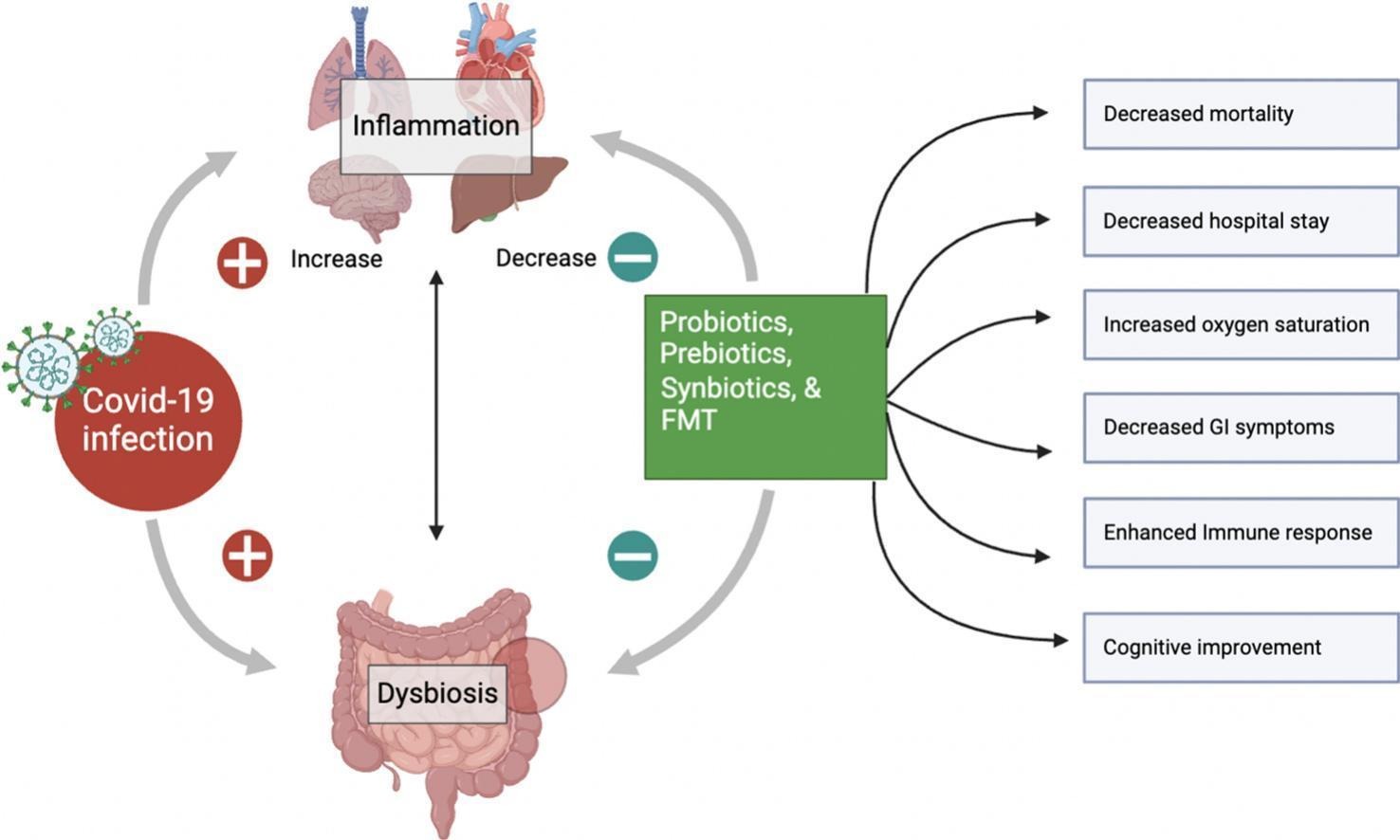💡 The study investigates the impact of COVID-19 on gut dysbiosis and explores the efficacy of various microbiome-modulating therapies, including probiotics, prebiotics, synbiotics, and fecal microbiota transplantation (FMT). The primary aim is to assess their effectiveness in alleviating gut dysbiosis associated with COVID-19 and their potential influence on disease severity and clinical outcomes.
📍 Materials and Methods : A systematic review was conducted, analyzing 27 studies that investigated the efficacy of probiotics, prebiotics, synbiotics, and FMT as interventions for COVID-19. The probiotics and synbiotics tested included bacterial and fungal genera such as 𝘓𝘢𝘤𝘵𝘰𝘣𝘢𝘤𝘪𝘭𝘭𝘶𝘴, 𝘉𝘪𝘧𝘪𝘥𝘰𝘣𝘢𝘤𝘵𝘦𝘳𝘪𝘶𝘮, 𝘚𝘵𝘳𝘦𝘱𝘵𝘰𝘤𝘰𝘤𝘤𝘶𝘴, 𝘌𝘯𝘵𝘦𝘳𝘰𝘤𝘰𝘤𝘤𝘶𝘴, 𝘗𝘦𝘥𝘪𝘰𝘤𝘰𝘤𝘤𝘶𝘴, 𝘉𝘢𝘤𝘪𝘭𝘭𝘶𝘴, 𝘚𝘢𝘤𝘤𝘩𝘢𝘳𝘰𝘮𝘺𝘤𝘦𝘴, 𝘢𝘯𝘥 𝘒𝘭𝘶𝘺𝘷𝘦𝘳𝘰𝘮𝘺𝘤𝘦𝘴. Prebiotics used in the studies included chestnut tannin, galactooligosaccharides, fructooligosaccharides, xylooligosaccharide, and resistant dextrin.
📍 Key Findings:
📌 Diversity of Microbiome-Modulating Therapies: Probiotics and synbiotics encompassed various bacterial and fungal genera, highlighting the diversity of interventions explored. Notable prebiotics employed included chestnut tannin, galactooligosaccharides, fructooligosaccharides, xylooligosaccharide, and resistant dextrin.
📌 Positive Effects on COVID-19 Patients : Majority of the investigated biotics exhibited positive effects, including symptom alleviation, reduction in inflammation, and notable decreases in mortality rates. Studies reported an average mortality ranging from 0% to 11% in intervention groups, compared to 3% to 30% in control groups.
📌 Efficacy of Probiotics, Prebiotics, and Synbiotics : Probiotics, prebiotics, and synbiotics demonstrated efficacy in diminishing the duration and severity of symptoms. Accelerated viral and symptomatic remission was observed with these interventions.
📌 FMT as an Effective Strategy : FMT emerged as an effective strategy, successfully restoring gut microbiota and ameliorating gastrointestinal disorders. FMT showed promise in reducing mortality rates and decreasing the duration of hospital stays.
📌 Multi-Organ Impact : Microbiome-modulating therapies positively impacted various health aspects, including respiratory and gastrointestinal health, cognitive function, mortality rates, oxygen saturation, and length of hospital stays. Adjunctive probiotics, such as 𝘚𝘢𝘤𝘤𝘩𝘢𝘳𝘰𝘮𝘺𝘤𝘦𝘴 𝘣𝘰𝘶𝘭𝘢𝘳𝘥𝘪𝘪, demonstrated significant improvements in mortality and the need for oxygen supplementation.
📌 Protective Mechanisms of Probiotics : Probiotics contributed to the maintenance of gut wall integrity, reducing gut permeability and preventing the translocation of toxins. Production of short-chain fatty acids (SCFAs) by probiotics played a crucial role in reinforcing the physical barrier and reducing the risk of systemic inflammation.
📍 Significance: The systematic review provides significant insights into the therapeutic potential of microbiome-modulating therapies in addressing COVID-19-induced gut dysbiosis. Probiotics, prebiotics, synbiotics, and FMT demonstrated positive effects on symptoms, inflammation, and mortality rates. The multi-organ impact of these interventions, particularly on respiratory and gastrointestinal health, suggests their potential as adjunctive therapies for COVID-19 patients.
📍 The findings from this systematic review support the use of probiotics, prebiotics, synbiotics, and FMT as potential interventions for COVID-19. The positive impact on gut dysbiosis, disease severity, and clinical outcomes underscores the importance of considering microbiome-modulating therapies in COVID-19 management. While the results are promising, further research is needed to understand the mechanisms underlying these effects and to establish their efficacy across diverse populations and disease severities. Incorporating these interventions into recommendations and guidelines may enhance the overall therapeutic approach to COVID-19.
Link to the article : http://tinyurl.com/yp9w6499
